Konstruert sanning : Ei oppgåve om autentisitet og subjektiv rekonstruksjon i dokumentarfilm
Master thesis
Permanent lenke
https://hdl.handle.net/11250/3100813Utgivelsesdato
2022-12-15Metadata
Vis full innførselSamlinger
- Studentoppgaver (SV-IMS) [1384]
Sammendrag
Tema for denne oppgåva er autentisitet, definert som ei subjektiv oppleving av sanning. Gjennom analyse av The Act of Killing (2012) og Rekonstuksjon Utøya (2018) har eg undersøkt korleis rekonstruksjon er brukt i filmane for å skapa autentiske augeblikk. For å kasta lys over dette er begge dei nemnte filmane analysert med utgangspunkt i teori om karakterutvikling og autentisitet. Vidare er det gjort forskingsintervju med Niels Pagh Andersen, klippar av The Act of Killing, og Carl Javér, regissør for Rekonstruksjon Utøya. Hovudfunna i oppgåva er at filmane sine subjektiv rekonstruksjonsmetodar, der menneske med traume frå historiske hendingar skal rekonstruera sine eigne minne, er med på å setja i gang ein prosess som tvinger karakterane til å handla i eit nå. Dersom motivasjonen til karakterane er stor nok for å gå gjennom prosjektet, vil også rekonstruksjonane kunne leggja eit ytre press på karakterane som kan føra til autentiske opplevingar som let seg filma. Dei autentiske opplevingane er ikkje knytt til sjølve rekonstruksjonane, men korleis dei historiske vitna forheld seg til rekonstruksjonane. Dei subjektive emosjonelle opplevingane av sanning, som filmskaparane ønsker å framstilla hos publikum, meiner informantane mine kan vera delte mellom fleire, og altså ikkje totalt subjektive. Dette er sanningar dei meiner fortel noko viktig om dei historiske hendingane det blir vist til, men dei handlar ikkje om fakta eller realitetar, og dei kan ikkje uttrykkast i ord, men heller i film gjennom subtekst som blir formidla i mellom anna auge, kroppsspråk og pausar. The theme of this assignment is authenticity, defined as a subjective experience of truth. Through analysis of The Act of Killing (2012) and Rekonstuksjon Utøya (2018), I have investigated how reconstruction is used in the films to create authentic moments. To shed light on this, both films have been analyzed based on theory of character development and authenticity. Furthermore, a research interview has been conducted with Niels Pagh Andersen, editor of The Act of Killing, and Carl Javér, director of Reconstruction Utøya. The main finding in the assignment is that the films' subjective reconstruction methods, where people with trauma from historical events must reconstruct their own memories, help to set in motion a process that forces the characters to act in the present. If the motivation of the characters is great enough to go through with the project, the reconstructions can also put external pressure on the characters which can lead to authentic experiences that can be filmed. The authentic experiences are not linked to the reconstructions themselves, but how the historical witnesses relate to the reconstructions. The subjective emotional experiences of truth, which the filmmakers want the audience to experience, my informants believe can be shared between several people, and are therefore not totally subjective. These are truths that they believe tell something important about the historical events that are shown, but they are not about facts or realities, and they cannot be expressed in words, but rather through subtext that is conveyed through, among other things, eyes, body language and breaks.
Beskrivelse
Master's thesis in documentary production.
